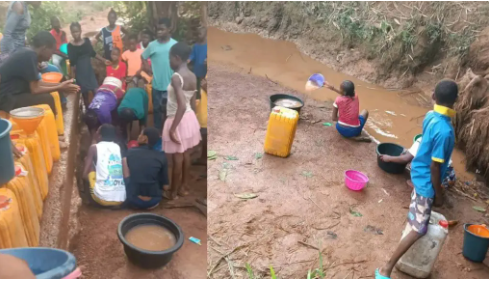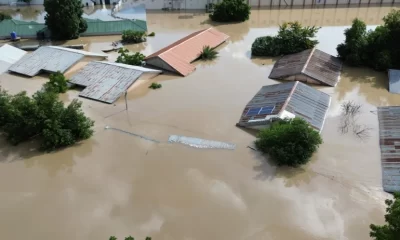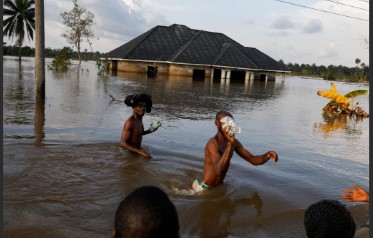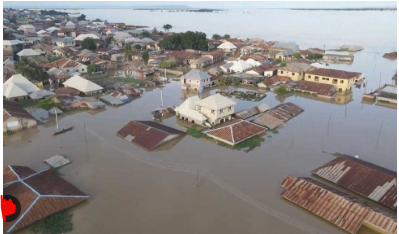The water crisis in Otukpo, Benue State, has escalated to alarming levels, forcing residents to resort to drinking from unsafe and contaminated sources such as muddy ponds, shallow wells, and polluted streams.
National Daily Newspaper reports that, as the dry season intensifies, previously reliable sources of water, including wells and streams, have dried up. This has left thousands of residents without access to clean drinking water.
Otukpo, the heart of Idoma land in Benue, has been grappling with a water crisis for decades.
Once a thriving town with access to clean water, it has now become a place where survival is increasingly dependent on luck, improvisation, and sheer resilience.
The situation worsens during the dry season, transforming what was already a dire problem into a full-blown humanitarian crisis.
At the center of this crisis is the long-abandoned Otobi Water Works, a facility that once served as the primary source of water for the town.
Despite its potential to alleviate the water shortage, the facility has remained non-functional for years due to neglect, mismanagement, and lack of government action.
As a result, residents, both in urban and rural areas, have had no choice but to drink from unsafe sources. The consequences of this crisis have been devastating.
Cases of waterborne diseases, including cholera, typhoid, and river blindness, have surged as a result of contaminated water. Women and children, in particular, bear the brunt of this struggle.
Every morning, before dawn, they embark on long treks from Otukpo town to neighboring Ohimini LGA, in search of water, often competing with animals for access to stagnant pools.
Several factors have contributed to the worsening water crisis in Otukpo. One major challenge is the region’s soil texture, which makes it nearly impossible to drill boreholes.
Otukpo’s terrain consists of hard, rocky soil that prevents the accumulation of underground water sources, unlike other areas where boreholes can be drilled to access groundwater.
However, the most glaring issue remains the collapse of water infrastructure, particularly the Otobi Water Works.
The facility, once designed to supply potable water to Otukpo, has suffered years of neglect and mismanagement, further exacerbating the crisis.
In addition to these issues, climate change and deforestation have worsened the situation.
The reduction in rainfall and increased environmental degradation have led to the drying up of rivers and natural water sources, leaving residents with fewer options for clean water.
Many rivers that once provided water to residents have now shrunk to mere trickles during the dry season.
Agbo John, a resident of Obaganya, spoke about another contributing factor: population growth and urbanization.
According to John, “As Otukpo expands, the demand for water has far outstripped supply. Yet, no significant investments have been made to upgrade or expand water infrastructure to meet the town’s growing needs.”
Pollution has also worsened the situation. Many of the water sources available to residents are contaminated by human and animal waste, making them breeding grounds for deadly bacteria and parasites.
In communities such as Edikwu, Entina, Igbanonmaje, and EiUpi, people fetch water from streams that are also used for laundry, bathing, and waste disposal.
One of the hardest-hit areas is Asa community, where residents now rely on the muddy remains of the Ukplo River for survival. Faced with these dire conditions, some citizens have taken matters into their own hands.
ALSO READ : INEC speaks on Akpoti-Uguaghan’s recall move, says petition lacks details
In a desperate bid for an alternative water source, residents have begun drilling the Ukplo River. Honourable Angbo Kennedy, a lawmaker representing Otukpo Akpa at the Benue State House of Assembly, recently made a generous donation to support this initiative, an effort that has been met with deep gratitude from the Asa community.
Meanwhile, in the absence of government intervention, philanthropist Mohammed Odeh Adah, known as “Ochacho,” has been supplying water to the town through his private initiatives.
His efforts have helped many families access clean drinking water, but the demand for water continues to far exceed supply.
Emmanuel Obotu, a resident of Otukpo Township, expressed the sentiment shared by many: “Every time Ochacho’s water trucks come, there’s a rush, and sometimes, not everyone gets enough. We appreciate his effort, but this is a town of thousands, and one person’s kindness cannot solve an age-long crisis.”
In response to the growing crisis, the Benue State government has acknowledged the severity of the situation and recently announced plans to revamp the Otobi Water Works.
The state’s Commissioner for Water Resources, Environment, and Climate Change, Hon Ugwu Ameh Odoh, stated that the Ministry of Water Resources, Environment, and Climate Change has been directed to commence the rehabilitation of the facility.
This restoration is expected to provide much-needed relief to the residents of Otukpo, Otobi, and the surrounding areas.


 Entertainment1 week ago
Entertainment1 week ago
 Entertainment5 days ago
Entertainment5 days ago
 Comments and Issues1 week ago
Comments and Issues1 week ago
 Comments and Issues1 week ago
Comments and Issues1 week ago
 Business1 week ago
Business1 week ago
 Health6 days ago
Health6 days ago
 Comments and Issues1 week ago
Comments and Issues1 week ago
 Health3 days ago
Health3 days ago












